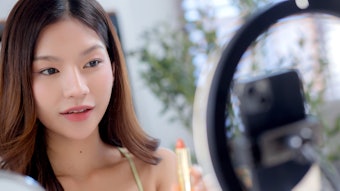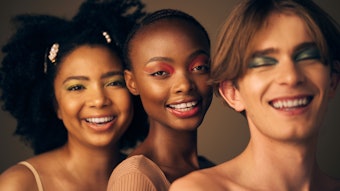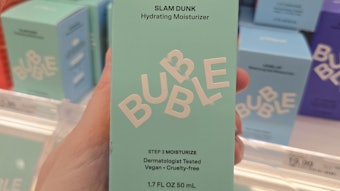
Scientific advances continue to shape how we approach hair and scalp health. Innovative commercial products have captured the attention of the beauty consumer, driving the market trajectory ever higher. Here, industry experts discuss these dynamics.
This article is only available to registered users.
Log In to View the Full Article
Scientific advances continue to shape how we approach hair and scalp health. Innovative commercial products have captured the attention of the beauty consumer, driving the market trajectory ever higher. Here, industry experts discuss these dynamics.
Hair and scalp care have seen remarkable growth in recent years, driven by heightened consumer awareness and demand for personalized, science-backed solutions. According to a report by Fortune Business Insights,1 the global hair and scalp care market is projected to reach $112.97 billion by 2030, exhibiting a CAGR of 5.6% between 2021 and 2028. This upward trajectory highlights the growing significance of high-performance formulations in this category, offering considerable opportunities for innovation among cosmetic chemists and R&D professionals.
Scientific advancements continue to shape how we understand and approach hair and scalp health. One recent example explored postbiotics, specifically focusing on the in situ production of lipid metabolites by Malassezia.2 According to the authors, these fungal-derived lipid mediators can reduce aesthetic and sensory discomfort, such as redness and itching, commonly associated with inflammatory skin and scalp conditions.
In other work, researchers examined signaling pathways and intervention mechanisms by which oxidative stress affects the hair follicle and hair growth. They also considered existing treatments for hair loss that act on the antioxidant pathway – looking to natural products promoting hair growth. Examples included the plant polyphenol resveratrol, with anti-inflammatory and antioxidant benefits, as well as the antioxidant component arctiin extracted from Arctium lappa.3
Innovative commercial products have also captured the attention of the beauty consumer. For example, the Kérastase Genesis Anti-Breakage Serum4 incorporates ginger root and edelweiss stem cells to address scalp sensitivity and hair breakage. Similarly, Briogeo's Scalp Revival Charcoal + Coconut Oil Micro-Exfoliating Shampoo5 leverages activated charcoal to cleanse and rebalance scalp health, while Odele's Ultra-Sensitive Shampoo6 caters to consumers with skin conditions through hypoallergenic, non-irritating formulations. These products underscore the fusion of technical sophistication and user-friendly benefits demanded by today’s consumers.
To gain insider views on these dynamics and future directions in hair and scalp care, we asked industry experts to weigh in. Here’s what they said.
Sustainability and Holistic Lipid Restoration
"The rise of the skinification of hair — treating hair with the same care and quality ingredients as skin care — has driven a demand for natural and sustainable active ingredients in hair care," explain Stephanie Hochstetler, applied technology manager, and Alexandra Mozina, regional marketing manager, both in the active ingredients division of Evonik Corp.
"Consumers increasingly seek products that enhance the health and appearance of their hair while aligning with eco-friendly and ethical standards. This shift reflects a broader trend toward holistic beauty routines that prioritize sustainability, transparency and the well-being of the consumer and planet."
Hochstetler and Mozina elaborate on the crucial role of natural actives in hair care, stating, "The importance of natural actives in protecting and repairing the loss of essential lipids in hair is critical. Restoring the hair's natural lipid barrier is crucial for maintaining moisture, strength and shine. By replenishing lost lipids, natural actives help prevent dryness, breakage and frizz, promoting healthier hair, while offering a gentle, sustainable alternative to synthetic ingredients."
Evonik's extensive portfolio responds to these demands, including bioactive, ceramide, botanical and delivery system solutions to address the growing demand for natural hair care solutions that fulfill essential lipid needs. “These ingredients are produced with sustainability at the forefront, utilizing processes such as bio-fermentation, upcycling and traceability," they write.
For example, CapilAcid (INCI: Water (Aqua) (and) Glycerin (and) Aristotelia Chilensis Fruit Extract) is a natural botanical extract designed to restore the hair's natural pH balance, enhancing shine and smoothness, while protecting the lipid barrier. In addition, Hairmimics Boost (INCI: Ceramide NG (and) Cholesterol (and) Palmitic Acid (and) Macadamia Integrifolia Seed Oil (and) Ricinus Communis (Castor) Seed Oil (and) Olea Europaea (Olive) Fruit Oil) is produced through biotechnology paired with traceable community projects.
Per Hochstetler and Mozina, the ingredients replicate the natural lipid composition of healthy hair and provide deep nourishment and repair. “Together, these innovations offer a holistic approach to hair care, aligning with consumer preferences for sustainable and effective products that promote hair health and vitality."
Hair ‘Longevity,' Wellness and Inclusivity
"Consumer preferences have shifted toward natural and sustainable hair care products due to several factors," observes Becky Stiles, Ph.D., head of marketing for personal care, BASF Corp. "Firstly, consumers are increasingly aware of the potential damage caused by synthetic chemicals in traditional products and are seeking gentler alternatives for healthier hair and scalp. Secondly, social media and influencers have played a significant role in driving this trend by exposing consumers to different hair care routines and creating a demand for specialized solutions.
“The focus on wellness and self-care has also fueled growth in the hair and scalp care market, as consumers seek nourishing products. Additionally, the desire for youthful-looking hair has increased the popularity of anti-aging hair care products, aligning with the trend toward longevity and aging well."
Stiles projected, “In 2025, the future of hair care trends will center on sustainability, innovation and personalization. Consumers will prioritize eco-friendly and natural alternatives, prompting the development of organic, plant-based ingredients. Technological advancements, including AI and machine learning, will enable highly customized formulations and data-driven solutions tailored to individual hair needs. Inclusivity and diversity will also play a pivotal role, as the growing demand for products catering to different hair types and textures creates new market segments and opportunities."
Stiles also highlighted ingredient innovations supporting these future directions. "PeptAlde 4.0 (INCI: Water (Aqua) (and) Hydrolyzed Rice Protein (and) Citric Acid) — a well-characterized rice peptide network with an exclusive molecular signature of four peptides — supports a healthy scalp and moisturizes brittle curls and coils,” she explains. “Rambuvital (INCI: Maltodextrin (and) Nephelium Lappaceum Seed Extract), an upcycled extract from sustainably sourced rambutan seeds, moisturizes the scalp and prevents odor from adhering to hair. Finally, Verdessence Alginate (INCI: Algin), a natural algae-based rheology modifier, provides multifunctional benefits as a styling fixative, offering natural hold and long-lasting curl definition, even in high humidity."
Simple, Effective and Biotech-driven
"In general, consumers are prioritizing strategic spending over excess and luxury, seeking value in all aspects of life," notes Piera Pericu, business segment lead for personal care, health and biosciences at IFF. "For hair and scalp care, this translates to a rising demand for high-performance, highly efficacious products tailored to hair type, lifestyle and environmental concerns. Consumers are actively researching ingredients and benefits to make informed decisions, preferring real results, simple solutions and attainable goals that integrate seamlessly into their lives over complex or exclusive offerings. Accessibility remains vital, as do safety, ingredient quality, availability and sustainability.”
Pericu adds that as consumers grow increasingly aware of their environmental impact, they expect brands to share this commitment without sacrificing performance. “People are investing time and resources in sustainable living, driving demand for transparency, honesty and trusted sources. Ethical boundaries defining 'natural' are expanding, with consumers reshaping the relationship between nature and technology. Advances in biotech are enabling solutions that meet sustainability goals while delivering exceptional performance.”
For example, IFF’s Aurist AGC (INCI: Water (Aqua) (and) Alpha-Glucan Hydroxypropyltrimonium Chloride (and) Propylene Glycol) is an award-winning, readily biodegradable hair conditioning polymer powered by the company’s proprietary Designed Enzymatic Biopolymers (DEB) technology platform. It has been reported to improve hair conditioning, fluffiness and glossiness.
"DEB is a cutting-edge biotech platform that employs enzymatic polymerization of glucose through biocatalysis to produce a new class of alpha-glucan polysaccharides,” Pericu explains. “These can be further customized and optimized to meet specific performance needs, much like natural polymers, for targeted applications."
Microalgae, Dry Dandruff and the Scalp as an Extension of Facial Skin
Cyrielle Houdin, marketing manager at Microphyt, sees two key shifts in the hair and scalp care segment. “This sector is undergoing significant changes driven by two key factors: the rise of skinification and the demand for sustainable products.
“The skinification trend emphasizes that the scalp is an extension of facial skin, underscoring the importance of scalp health,” she explained. “A healthy scalp is now widely recognized as essential for vibrant hair and deserves the same care as facial skin. Additionally, consumers are increasingly favoring hair care products made with sustainable ingredients, following trends seen in the broader cosmetics industry.”
Houdin continued, “Knowledge about the scalp and advancements in biotechnology are key to revolutionizing hair treatments. Deeper research into scalp health, driven by growing consumer demand, is making it easier to understand this often-overlooked and hard-to-access skin. Meanwhile, breakthroughs in biotechnology are leading to the development of innovative ingredients and treatments, including new molecules that enhance the effectiveness and diversity of hair care solutions.”
Per Houdin, Microphyt is focused on microalgae — microscopic yet powerful organisms, for which the company developed a unique technology to unlock their untapped potential. “Leveraging this innovation and inspired by the skinification trend, we tested Luteana Scalp (INCI: Caprylic/Capric Triglyceride (and) Tisochrysis Lutea Extract (and) Tocopherol), a proven sustainable active ingredient for sensitive skin, on scalps affected by dry dandruff. Unlike oily dandruff, dry dandruff presents unique challenges, which Luteana Scalp successfully targets by restoring balance.”
This groundbreaking ingredient, as described by Houdin, reduces the spread of dry dandruff in just seven days, delivering noticeable improvements in scalp health and overall quality of life.
Health, Strength, Bond-building and Science-backed
"A key trend in hair care is the shift toward science-oriented ingredients and ingredient transparency," writes Erika Milczek, CEO, Curie Co. "Consumers are increasingly focused on understanding how products work coupled with the pursuit of healthy hair. They’re prioritizing solutions that address damage caused by chemical treatments, heat styling and environmental stressors, while also building strength and resilience.
"This demand is driving growth in technologies like bond builders and multifunctional treatments that offer visible results alongside long-term hair health benefits. Brands have the opportunity to explore storytelling that educates consumers on how ingredients and formulations effectively support hair health and address specific concerns. Utilizing concentrated ingredients and active complexes as boosters creates effective, tailored solutions for reducing frizz, locking in styles and supporting textured hair."
Milczek adds that biotech is unlocking new possibilities in hair care. "Innovations such as Curamina (INCI: Transglutaminase (and) Water (Aqua) (and) Glycerin), a bioactive bond builder, show how science can advance hair health. Curamina interacts with proteins, like hydrolyzed keratin, wheat and soy, to form durable peptide bonds that create a protective film around the hair fiber. This enhances strength, manageability and color retention, enabling brands to deliver effective, sustainable, science-driven solutions that meet consumer demand for transparency and efficacy."
High Performing, Advanced and Inspiring Wellness
Michelle Rivera, senior formulation chemist at Presperse, responds, “Hair care is scalp care is skin care! Hair care regimens, like skin care regimens, feature targeted actives for hyper-personalized scalp care, extending to brow, beard and lash.
"Innovation and shifts toward ingredients that promote scalp health, hair regrowth, preventing and reversing hair graying, hair density and overall well-being are massive drivers. Peptides, exosomes, actives, encapsulation technologies, film formers, new textures, delivery formats and applications all allow for creative, high-tech formulations."
Rivera adds, "Innovation is pushing new boundaries. Expect to see microalgae-derived compounds promoting hair growth and protecting against stressors; brands incorporating microbiome-balancing formulas; and the integration of mental well-being and neuro-cosmetic aspects in hair care. Consumers recognize the connection between hair health and emotional wellness and are seeking more scalp treatments and overnight conditioning therapies."
She continues, "The growing focus on wellness extends beyond physical benefits to include emotional well-being. A well-established technology in neuroscience, electroencephalography (EEG), has been introduced into personal care to measure emotional responses. EEG tracks emotional valence changes, offering deeper insights into users’ well-being.”
Rivera gives the example of Presperse’s Inawave Polyporus ingredient (INCI: Water (Aqua) (and) Glycerin (and) Polyporus Umbellatus (Mushroom) Extract (and) Potassium Sorbate), which aligns with these themes. “This bioactive enhances hair follicle cell proliferation, improves hair density and reduces hair fall. It supports psychological well-being, with panelist and EEG studies confirming increased self-esteem, reduced negative emotional valence and positive arousal," she concludes.
Skinification, Personalization, Sensory Regulation and Microbiota Focus
"The beauty industry is witnessing a skinification of hair care, with scalp health taking center stage," shared Marcia Paula, global category director for hair care at Symrise AG. "Symrise, one of the first companies to talk about scalp skinification, recognizes that scalp health is the foundation for healthy hair. Driven by a growing understanding of scalp health and a rising consumer focus on wellness and self-confidence, scalp care is now an essential part of the beauty routine. Consumers are seeking skin care-inspired ingredients and routines for their scalps, mirroring that of their skin care regimen."
"Looking ahead, this trend will move toward personalized and holistic scalp solutions," Paula continues. "There’s untapped potential in addressing unbalanced scalp microbiome and lipidome with greater precision, considering individual needs and environmental factors. Advanced diagnostics will guide tailored treatments and integrative approaches linking scalp health to overall well-being."
She further emphasized the critical role of innovation in advancing scalp care. "Biotech innovation is key to unlocking this potential. SymControl Scalp (INCI: Water (Aqua) (and) Glycerin (and) Mannitol (and) Tetraselmis Suecica Extract), derived from renewable microalgae, exemplifies this by naturally rebalancing sebum production. SymHair Force 163 (INCI: Pentylene Glycol (and) Isochrysis Galbana Extract) uses algae extract technology to strengthen hair at the root and to prevent hair loss."
Paula also highlighted the importance of microbiota and sensory regulation technologies. "SymReboot L19 (INCI: Maltodextrin (and) Lactobacillus Ferment) uses proprietary para-probiotic technology to rebalance scalp’s microbiota and to restore scalp's natural defenses against dryness and flaking,“ she writes. “For sensitive scalps, SymSoft Scalp (INCI: Trideceth-9 (and) PEG-5 Ethylhexanoate (and) Water (Aqua) (and) Hydroxyphenyl Propamidobenzoic Acid) is a complex of ingredients leveraging neurosensory regulation to reduce itchiness."
According to Paula, these technologies, focusing on natural efficacy and targeted action, are “enabling the next generation of scalp care, paving the way for healthy and beautiful hair from the root."
Conclusions
Skinification echoes across hair and scalp care innovation, driven by high-performing, biotech-derived, sustainable solutions personalized to the user. Add to this a wellness and self-esteem boost, and hair care benefits will rise to new occasions.
References
- Fortune Business Insights. (2021, Jun 22). $112.97 Billion hair care market to reach by 2028; Backed by increasing demand for hair maintenance products among men, reports Fortune Business Insights. Available at https://shorturl.at/5K1SL-
- Pagac, M.P., Gempeler, M. and Campiche, R. (2024). A new generation of postbiotics for skin and scalp: In situ production of lipid metabolites by Malassezia. Microorganisms. Available at https://www.mdpi.com/2076-2607/12/8/1711
- Du, F., Li, J., Zhang, S., Zeng, X., Nie, J. and Li, Z. (2024, Jun 25). Oxidative stress in hair follicle development and hair growth: Signalling pathways, intervening mechanisms and potential of natural antioxidants. J Cellular Molecular Med. Available at https://pmc.ncbi.nlm.nih.gov/articles/PMC11196958/
- Kérastase Paris. (Accessed 2025, Feb 7). Genesis fortifying hair care. Available at https://shorturl.at/jxXBw
- Briogeo. (Accessed 2025, Feb 7). Charcoal + Coconut Oil Micro-Exfoliating Shampoo. Available at https://www.briogeohair.com/products/scalp-revival-charcoal-coconut-oil-micro-exfoliating-shampoo
- Odele. (Accessed 2025, Feb 7). Ultra Sensitive Shampoo. Available at https://odelebeauty.com/products/ultra-sensitive-shampoo?srsltid=AfmBOoryvUU8_4MGNZ_2j1Ye5uACLDwzbZp95eGI8AOA1IcHCTWhcXgW












